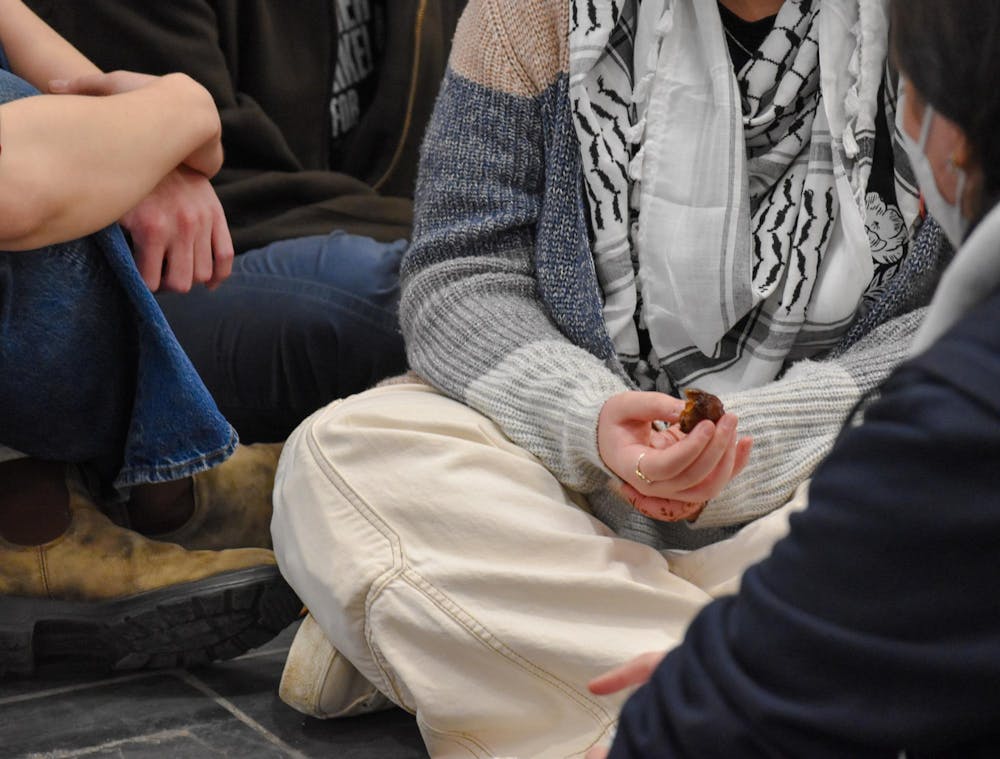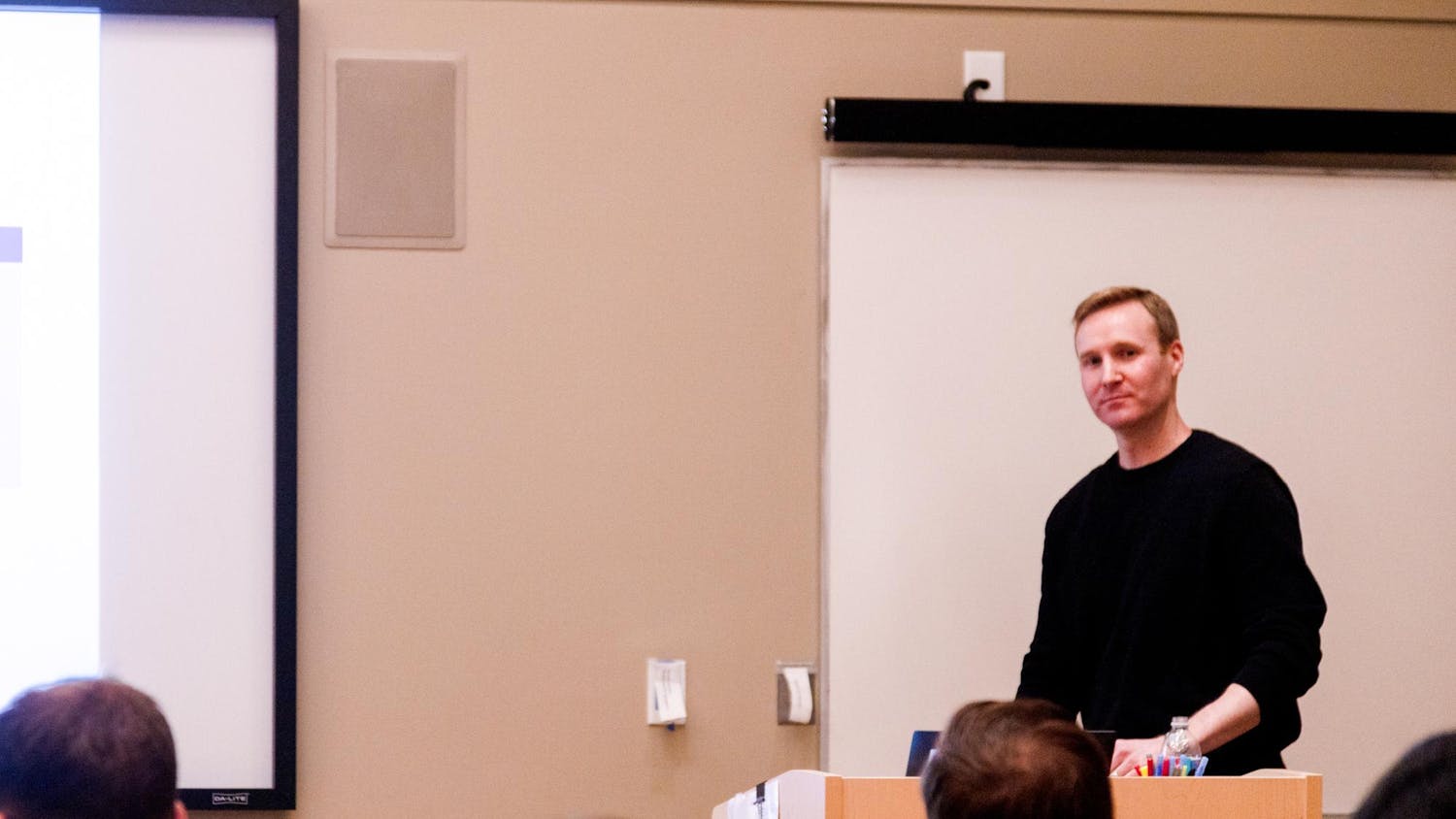The 17 students who remained on hunger strike in support of divestment concluded their now eight-day refusal to eat at 5 p.m. Feb. 9 at the Stephen Robert ’62 Campus Center, along with around 200 other students who joined a 32-hour solidarity fast.
“Rather than continue the strike with now-obsolete demands, the strikers decided collectively to end their strike, along with 200+ student solidarity fasters, at 5 p.m. on Friday,” stated a Brown Divest Coalition statement shared with The Herald by Strike Spokesperson Sam Stewart ’24.
The strikers had demanded that the Corporation, the University’s highest governing body, consider during its February meetings a resolution to divest from companies “associated with human rights abuses in Palestine” — as identified in a 2020 report by the Advisory Committee on Corporate Responsibility in Investment Practices.
On Feb. 2, Paxson wrote that she “would not commit to bring a resolution” in front of the Corporation and suggested protesters file a proposal with the Advisory Committee on University Resource Management. Senior Vice President for Communications Cass Cliatt said that the contents of meetings are not public.
At the Campus Center, strikers shared their experiences and demonstrators sang before breaking fast by eating dates.
Earlier in the day, around 150 protesters demonstrated outside of Faculty Club, The Hope Club and the Watson Institute for International and Public Affairs as members of the Corporation conducted their February meetings, The Herald previously reported.
The protest saw Corporation members come face-to-face with the strikers. No Corporation members responded when The Herald asked if the governing body discussed the divestment proposal in their meetings today. Multiple Corporation members were seen holding copies of the BDC’s extended 2020 ACCRIP report, which were handed to them by protesters as they entered and exited the buildings.
The University has repeatedly stated that it does not directly invest in weapons manufacturers, and that it selects external investment “managers whose values are aligned with the Brown community,” according to the Investment Office.
Over 100 students at Pomona College, the University of Chicago, Indiana University, Mount Holyoke College, Yale and Harvard have organized solidarity strikes in support of the strikers at Brown, according to a UChicago United for Palestine Instagram post.
“Throughout the protest, the students’ health and well-being was our primary focus, as well as ensuring they understand the mechanisms available to all members of the Brown community to request that the University consider divesting its endowment from the assets of specific companies,” President Christina Paxson P’19 P’MD’20 wrote in an email to The Herald this Friday. “We also made clear that the bar for divestment is very high — the University consistently rejects calls to use the endowment as a tool for political advocacy on contested issues.”
“Members of the Brown Corporation during meetings this week acknowledged the activism on campus by students advocating for divestment, including the group of students engaged in the days-long protest that ended Friday evening,” Paxson wrote.
“The Corporation members discussed education efforts to ensure the community is aware of the long-established mechanisms to formally request that the University consider divestment proposals,” she added, stating that “no new proposals for divestment had gone through this process for consideration at the February meetings.”
Editor’s Note: Below is a summary of previous coverage by The Herald detailing common questions about the strike and related University policies.
What did the students demand?
The 17 student protestors refused food until the Corporation — the University’s highest governing body — “hears and considers a divestment proposal” during its meetings that began Thursday. The strikers say the proposal should be consistent with the 2020 report by the University’s Advisory Committee on Corporate Responsibility in Investment Practices that recommended divestment from “companies which profit from human rights abuses in Palestine.”
Paxson previously refused to bring ACCRIP’s recommendations to the Corporation for consideration, saying that the report “did not meet established standards” for divestment. On Friday, she maintained this position and refused to revisit her decision. She also denied the protestors’ request for a Corporation divestment resolution.
Instead, she encouraged the protestors to submit a divestment proposal to the Advisory Committee on University Resource Management — the successor to ACCRIP — instead of demanding a Corporation resolution.
The protestors have refused this referral to ACURM, saying that the length of time required to consider this proposal in the committee is “an untenable timeline given the urgency of the crisis in Gaza,” according to a statement from strike organizers to The Herald.
Past demonstrators, including the 41 students who were arrested during a December sit-in on trespassing charges, were previously referred to ACURM when they demanded divestment from “Israeli military occupation.”
What investments does the University hold?
At a November public meeting, representatives from the University’s Investment Office told attendees that Brown’s direct investments do not include weapons manufacturing or those with direct ties to Israel.
University Spokesperson Brian Clark echoed this statement in a Sunday email, writing that Brown is “not directly invested in any defense stocks or large munitions manufacturers.”
A large portion of the University’s endowment is invested in external managers with portfolios that are undisclosed under contractual confidentiality provisions. At the November meeting, the Investment Office said none of these portfolios focus on weapons manufacturing and they select “managers whose values are aligned with the Brown community.”
Clark also wrote on Sunday that the University is “confident that our external managers have the highest level of ethics and share the values of the Brown community, including the rejection of violence.”
The University has only passed two full, official divestment resolutions in the past.
What health safeguards did the strikers have in place?
The protestors were cleared to participate in the strike by individual consultation with physicians prior to the demonstration, The Herald previously reported.
“All strikers have been testing for COVID daily and constantly wearing high quality masks, as has anyone who has interacted with them,” Stewart wrote.
According to Stewart, “there are thorough contingency plans in place in case of an emergency” as they continue “monitoring vitals regularly to ensure we are up to date on striker health.”
In a Feb. 2 letter to the protestors, Paxson encouraged the students to “safeguard (their) health and well-being” while exercising their “right to protest.” She also highlighted University mental health and well-being resources.
She added that “protest is also unacceptable if it creates a substantial threat to personal safety of any member of the community.”
The University previously disenrolled four students participating in a hunger strike protesting the University’s partial divestment policy of South African apartheid in the 1980s. The then-administration cited health and liability concerns for the disenrollment, according to a 1986 article by The Herald.

Anisha Kumar was the senior editor of community and standards of The Herald's 135th editorial board. She previously served as a section editor covering University Hall and international student life. She is a junior from Menlo Park, California concentrating in English and Political Science who loves speed-crosswording and rewatching sitcoms.

Ryan Doherty was the managing editor of digital content and vice president of The Herald's 135th editorial board. He is a junior from Carmel, NY who is concentrating in chemistry and economics. He previously served as a university news and science & research editor, covering faculty and higher education.

Tom Li was the editor-in-chief and president of The Herald's 135th editorial board. He is from Pleasanton, California and studies economics and international and public affairs. He previously served as a metro editor, covering the Health & Environment and Development & Infrastructure beats, and has worked on The Herald's copy editing, editorial page board, design and podcast teams.
Dana Richie is a senior staff writer for Arts and Culture and the photo chief. She enjoys using multiple forms of media to capture peoples’ stories and quirks. In her free time, she loves knitting, learning about local history and playing ultimate frisbee.





